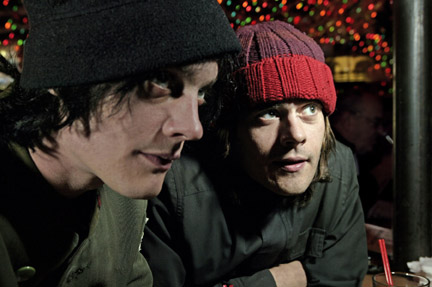|
April 8, 2004 My heart is the bums on the street w/ nuthin to eat n' their dirty hands cupped up My heart is the avenue wind, rattling street signs with its delicate din ... Every
inch of this city reminds me of you "My
Heart Is the Bums on the Street," You might take the kids out of Philadelphia, but you can't take the city out of the kids from Marah. After a two-year layoff, brothers Dave and Serge Bielanko are on the road polishing songs from their band Marah's next album, "20,000 Streets Under the Sky." |
The CD, due out June 29, continues the brothers' gift for using city life as a metaphor. It also expands the Ramones/Motown/Springsteen rock sound of 2002's "Float Away With the Friday Night Gods" - flute here, hand claps there - while returning to some of the acoustic sounds that made their debut, "Let's Cut the Crap & Hook Up Later On Tonight" (1998), an alternative-country favorite. A strong four-song preview of the new CD contains one stunner, "Freedom Park," and Dave Bielanko, reached via his cell phone somewhere on the road in Oklahoma, says Marah (rhymes with hurrah) spent most of last summer working on it. It boasts a rocking, addictive rhythm backed by hand claps and a chorus of girls chanting schoolyard rhymes ("shimmy shimmy ko ko pop ... itsy bitsy teenie weenie"). "That song reflects the whole Phil Spector illusion I've lived under for a while," Bielanko says, referring to the Rock and Roll Hall of Famer's "wall of sound" production style. The first song he heard for the new CD was "Feather Boa," which his brother Serge played for him over the phone, and it was "most amazing." "It's about the life lived by a transvestite, who is waiting for someone to kill him/her - she's walking around in fear," Dave says. "So much of our lives are lived in fear. In this profession, you live under the possibility of being run out of the business at any moment. So you have to have a strong inner spirit, like a transvestite walking down a city street. The idea (for the album) fell into place after that." But all is not bleak in Bielanko songs, because an element of hope coexists with the fear, as in "Freedom Park" and in "East," another new song, in which "the characters are staring beyond their city and thinking there's a better way to be, sort of like George Bailey in 'It's a Wonderful Life,'" Dave says. The CD title is borrowed from a book by an obscure British writer from the 1930s, Patrick Hamilton, one of Serge Bielanko's favorites. Dave Bielanko says, "The span of the stories seems very vast, and the (book) title seems very vast. (Hamilton) wrote about the underbelly of London, and he died in obscurity, which I think is quite cool. But beyond anything else, it's a great name and it just suited our record." Marah formed in 1993 and put out its first CD in 1998, and Bielanko says his only regret is that Marah has released only one album every two years. That's why Marah obtained an amicable divorce from Artemis Records, formed its own imprint, PHIdelity Records, and allied with Yep Roc Records. "We knew we had to make a record on our own and not go into crazy debt over it," he says. "We also knew we'd need to team up with a good American indie. We're interested in playing (headlining) our own shows and playing for a long time and becoming a great live band. The indie thing, and to make a record a year, the time was now for us to do that." Marah is reissuing its debut album, "Let's Cut the Crap ...," on PHIdelity with tracks that didn't make the cut in 1998. "It's an amazing record to me now," Bielanko says. "I have no idea how we could have been so nuts, but that's how you are when you're 21." Bielanko says that "we were somewhat freaked out" about the early-alt country label, especially because Marah tries to keep the Ramones and Motown in play "in almost everything we try to do." "But in the truest sense, we write folk songs, and if the (alt-country) label had a bit of a broader reach, I wouldn't be so scared of it. "To me, it's rock 'n' roll and what we grew up with, and I'd like to protect that." |
|
